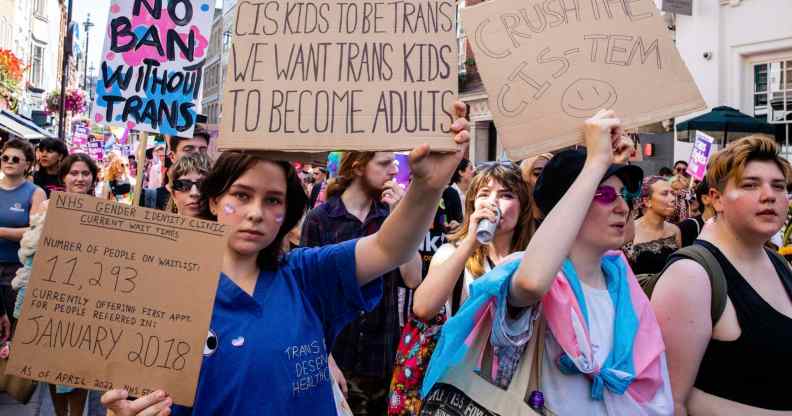Stonewall explains ‘unclear’ tweet about trans kids and inclusive education

Studies have suggested that trans young people have a good grasp on their gender identity at a young age. (Mark Kerrison/In Pictures via Getty Images)
Stonewall has clarified an “unclear” tweet about trans youth that spurned fierce backlash from anti-trans groups.
On 23 July, the LGBTQ+ campaign group shared a first-person piece published on Metro.co.uk.
The piece was written by an anonymous parent recounting how their four-year-old gender non-conforming daughter was not supported by her nursery.
Stonewall tweeted: “Research suggests that children as young as two recognise their trans identity.
“Yet many nurseries and schools teach a binary understanding of pre-assigned gender. LGBTQ-inclusive and affirming education is crucial for the well-being of all young people!”
Research suggests that children as young as 2 recognise their trans identity. Yet, many nurseries and schools teach a binary understanding of pre-assigned gender.
LGBTQ-inclusive and affirming education is crucial for the wellbeing of all young people! ?https://t.co/RKDwnzZMfe
— Stonewall (@stonewalluk) July 22, 2022
The tweet touched off intense criticism online for referencing research which suggests that children – gender-diverse children included – begin expressing their gender when they are around two to three years old.
Among the critics was Matt Walsh, an anti-trans commentator, who wrote: “These people are pure evil.”
Many anti-trans Twitter users referred to the charity as “pedos”, “insane” and “perverse”.
In response, Stonewall said in a statement: “On [23 July] we put out a tweet that was unclear, relating to gender stereotypes and nursery age children, leading some supporters to ask us what we meant.
“We were commenting on an article written by a parent reflecting on how their child was being cared for at nursery.
“The parent was worried that their child was being pressured to fit in with stereotypes about boys and girls.
“While we don’t actively work on nursery education, we believe that young children should be able to play, explore and learn about who they are, and the world around them, without having adults’ ideas imposed upon them.”
The charity said it supports “age-appropriate” teaching about LGBTQ+ lives, something Stonewall said is crucial for ensuring stigma is not passed on to the next generation.
“For primary school-aged children, this might mean, for example, learning that some children have two mummies, some have two daddies,” the statement continued.
“It might mean not forcing children to conform to stereotypes, and it might mean challenging bullying that relates to perceived difference.”
Stonewall has increasingly come in the firing line simply for supporting a vulnerable and deeply marginalised community.
The non-profit faced a “coordinated attack” from the British press in 2021 over its Diversity Champions workplace inclusion scheme that boasts hundreds of members, with critics fixating on Stonewall’s support for trans rights.
Research has found that very few trans young people change their minds about their gender after socially transitioning before the age of 12.
The Trans Youth Project followed 317 children in the US and Canada as they changed their names, pronouns and haircuts. The study included children who began their gender journey between the ages of three and 12.
Five years of affirming their gender later, only 2.5 per cent, or eight children, said they are not trans.
As other studies have shown, many kids who go on to transition do so because they already have a strong sense of their gender identity.

